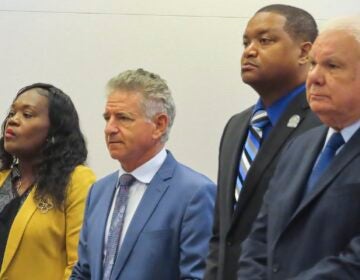Commentary: Who has the biggest stake in NJ’s pension reform
Two weeks ago, timed precisely to coincide with Governor Christie’s budget address, New Jersey’s Study Commission on Pension and Health Benefits released a report that calls for substantive changes in the ways that the state structures pension and health benefits for public employees.
As one might expect with such a politically-fraught topic, denouncers of the Commissioners “Roadmap to Resolution” showed up in droves, easily outnumbering Commission members and their biggest booster, Governor Chris Christie. Here’s a run-down of the major players invested in the outcome of the Commission’s recommendations.
NJEA: According to a much-publicized memo released with the 50 page report, NJEA President Wendell Steinhauer and Executive Director Edward Richardson had “numerous meetings” with the Commission to arrive at the plan to steer N.J. away from the crater that is the state pension system– $83 billion in debt –and to modify school employees’ generous healthcare plans. During his budget speech Christie trumpeted this consensus as an “unprecedented accord,” to freeze current pension plans and move to a 401K-style defined contributions plan, to transfer oversight of pensions to a trust managed by NJEA, and to replace “platinum” level health benefits with more modest plans that would specify higher employee co-pays and deductibles.
As soon as Christie left the Statehouse floor, teacher union leaders went into defense, releasing a statement averring that “NJEA is deeply disappointed that Gov. Christie overstated the nature of the understanding we reached with the commission after many months of conversation.” According to the Philadelphia Inquirer, NJEA leaders were “deeply embarrassed,” although Steinhauer accepted both the math and the urgency: “[The pension plan is] now within 12 years of going default,” he said. “That’s a major concern to me. Within six, that’s when you start selling off assets and go into a downward spiral. We need to take action now.”
Other N.J. labor unions: No other union’s pension plan is in as bad shape as NJEA’s but the Study Commission’s recommendations apply to them too. If it ain’t broke, say leaders of the fire fighters and police, don’t fix it. Patrick Colligan, head of the Police Benevolent Association, said that if he were in charge of NJEA, he’d also “be at the table begging for help.” But, “to be brutally honest, as crass as it sounds, our pension is really actuarially doing well.”
Senate President Steve Sweeney: the Democratic leader, currently ogling Christie’s office, is sanguine. What could be bad? Four years ago when he forced through a pension and health benefits reform bill, union leaders gave him the cold shoulder; NJEA didn’t even endorse him. But now he’s a hero for taking umbrage at Christie’s call for compliance with the Study Commission report. After all, that 2011 pension reform bill that Sweeney brokered with Christie mandated escalating state payments to the pension fund (as well as higher premium contributions from state workers), and we all know how that went: Christie pleaded poverty and shortchanged the formula, which next year would require a $2.25 billion payment.
But Sweeney argues that if Christie would comply with the law everything will be fine, especially if you throw in a millionaire’s tax. (The Commission begs to differ, explaining that even a $50K annual tax on each millionaire would still require a 23 percent increase in income taxes.) Said Sweeney to NJ Spotlight, “We’re not breaking the commitment. If we stay the course, the pension system will be fine — it’s not going to bankrupt us.” To further solidify his fiscal prognostication acumen, Sweeney has proposed a pilot program to “make healthcare more affordable.”
Gov Christie: Face it: this presidential-hopeful (currently at a feeble 6 percent in GOP polling) is desperate for some good news, so he’s touting NJEA’s alleged sign-off on the Commission report as an emblem of his ability to be, well, presidential. Four years ago he most likely thought that the 2011 pension reform bill would grease the skids on his White House trajectory, but overly-rosy economic predictions made those reforms inadequate to salvage a broken pension system.
But even he must know that the odds of the Commission’s recommendations becoming law are slim to none. The Commission practically concedes this point. From the report:”We recognize that there are elements of this approach that are likely to be unpopular at first… The need for urgency in adopting a solution cannot be overstressed. The already narrow window for a reasonable solution is closing fast. Only decisive action now can preserve a solid foundation of public employee benefits before the ever-growing hole the State has dug itself into becomes too deep for the State to dig itself out of without crushing tax increases and deep cuts to employee benefits and public services.”
And what would it take to implement the Commission’s plan? No less than a constitutional amendment that would have to be approved by the Legislature in August and then approved by the public in November, because pension pay-outs are nonforfeitable rights and can’t be abridged through legislative or executive action. That’s a non-starter for a Legislature dependent on union largesse, and it would take Sweeney’s backing to even bring an amendment to the Senate floor.
The Commission’s report concludes, “The State now stands at a crossroads and must choose one of two paths. The first is the road to ruin. It leads to a future of either crushing tax increases or draconian benefit cuts plus crushing tax increases. The second path is one that leads to a more sustainable future.” Let’s hope there’s a third way._________________________________________________
Laura Waters is vice president of the Lawrence Township School Board in Mercer County. She also writes about New Jersey’s public education on her blog NJ Left Behind. Follow her on Twitter @NJLeftbehind.
WHYY is your source for fact-based, in-depth journalism and information. As a nonprofit organization, we rely on financial support from readers like you. Please give today.





